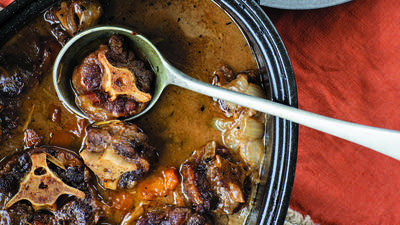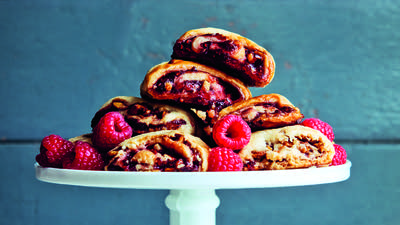
[This interview was recorded in 2007.]
Joshua Bell served as the violinist on the score of The Red Violin, a movie about a violin created by a master craftsman in Italy in the 1600s. Bell learns how to make Tagliatelle with Caramelized Oranges and Almonds, a dish that was eaten in Italy at the time.
Joshua Bell: I've always had this idea of having house concerts -- I love playing in people's houses for charities or for warm-up concerts -- and involving food. I have a couple of friends who are chefs. I thought about having a concert in the house and having my friends come over. We'd play a salon -- like the old-fashioned salon -- and then one of my friends, a chef, or me once you teach me how to cook, would involve food and music. I think they go well together.
Lynne Rossetto Kasper: I think it would be great. I always associate performers and musicians as being people who love good food.
JB: Musicians and food -- my friends who are non-musicians, whenever they come out with us, they just can't believe how much we eat. There is nothing like going out to eat with friends after the stress of a concert.
I've always loved food. Even my parents love food. I remember my first tour in Europe when I was 14. My parents came along with me. We went to several great three-star Michelin restaurants. I started to really understand great food at an early age. It's one of my biggest hobbies.
LRK: The Red Violin begins, if I'm remembering correctly, in the 1600s in Italy.
JB: It does. The story begins with a violin maker from that time who is a Stradivarius lookalike. This is a fictitious character. But around that time, my violin was made in 1713 by Stradivarius. The film takes place around that time, maybe at the end of the 17th century.
LRK: Why not make a pasta that did come out of a century before that, but would still have been eaten? This is a pasta that if you decide you want to make for friends, they will never have had anything like it because it's about how people ate at that time.
JB: I have actually no idea how people ate at that time in Italy.
LRK: Just really very basic. I could do a 45-minute lecture on this, but I'll give you the short version.
At that time the tomato hadn't taken hold. If you had any money, you used sugar because sugar was extremely expensive. Sugar would appear in dishes from the beginning of the meal to the end. Things were sweet and savory.
JB: It's hard for me to imagine Italians cooking without any tomatoes at all. But I guess it came over from North America.
LRK: It didn't get adopted with any kind of enthusiasm until the beginning of the 1700s. You know the first recorded pasta recipe with tomatoes? 1837.
What we're doing is Tagliatelle with Caramelized Oranges and Almonds. This was a dish of the very wealthy. If you had butter, that meant you had enough land to raise cows. Butter was a sign of immense wealth. Much of Italy was fat-poor in those days. Pig fat was what most people could afford.
JB: I don't want to show off, but I guess we'll still use butter.
LRK: Let me explain the procedure: We're going to make a caramel, but it's going to become savory with a lot of black pepper. The play of flavor you get is melted butter simmered with orange juice until it caramelizes. Add sugar, a lot of black pepper and a lot of the rind of the orange, which has that bitter but aromatic quality. That's balancing against the sweet in the orange. Then finally the pasta is tossed in with that.
But the topping is the really interesting part because this topping exists on pastas historically from the 1400s well into the end of the 1600s. It has cheese, sugar, cinnamon and almonds. You make this pasta and people say, "I'm never going to eat it." They usually end up loving it.
I live next door to a violinist. I know she's very careful of her hands. So we want to keep you away from knives?
JB: I try to stay away from knives as much as possible … and from cleaning up plates after meals.
LRK: We don't need the knives. What a great way to get out of clean-up. Now I just have to take up an instrument.
Make the recipe: Tagliatelle with Caramelized Oranges and Almond
Before you go...
Each week, The Splendid Table brings you stories that expand your world view, inspire you to try something new and show how food brings us together. We rely on you to do this. And, when you donate, you'll become a member of The Splendid Table Co-op. It's a community of like-minded individuals who love good food, good conversation and kitchen companionship. Splendid Table Co-op members will get exclusive content each month and have special opportunities for connecting with The Splendid Table team.
Donate today for as little as $5.00 a month. Your gift only takes a few minutes and has a lasting impact on The Splendid Table and you'll be welcomed into The Splendid Table Co-op.




